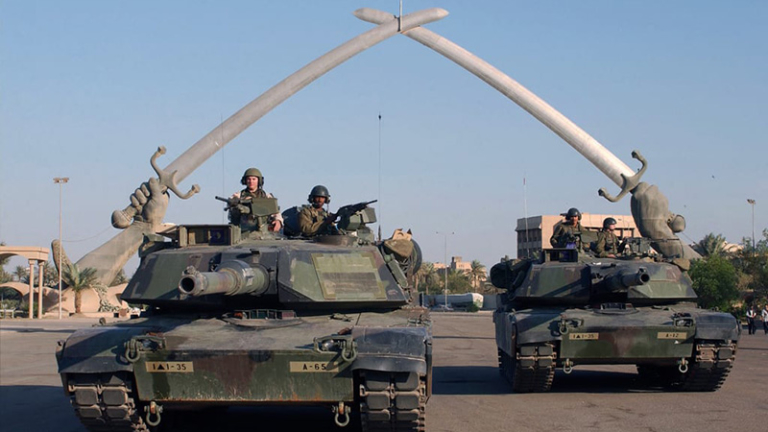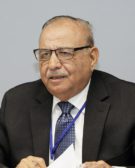
On March 20, 2003, the United States led an invasion of Iraq supposedly meant to halt its development of weapons of mass destruction. Lacking the support of the United Nations, the George W. Bush administration used an October 2002 congressional resolution to justify the invasion that ultimately toppled the Saddam Hussein regime. The United States and its partners in the military invasion then established the Coalition Provisional Authority (CPA), a transitional government that supervised the creation of the Iraq Interim Governing Council, which, in turn, gave way to the Iraqi Transitional Government that supervised the writing of the country’s new constitution in 2005. Years of searches carried out by both military and civilian experts failed to find any weapons of mass destruction in Iraq; but regardless, the invasion resulted in the collapse of Saddam Hussein’s Baathist regime. Although the American occupation of Iraq formally ended in 2011, roughly 2,500 US troops still remain in the country.
The American invasion destroyed the Iraqi state as constituted by many decades of Baathist rule. The first two orders the CPA issued were orders for the “de-Baathification” of Iraq and the dissolution of the Iraqi Army. The first resulted in the dismissal of hundreds of thousands of Iraqis employed by the state, including skilled administrators and bureaucrats, while the second left the country’s internal security at the mercy of armed groups and militias that quickly formed in the wake of the invasion. The obvious winners of the de-Baathification law were Shia opponents of the former regime and expatriate politicians and activists who were enthusiastic proponents of the invasion and of regime change.
Arab Center Washington DC has asked its fellows and affiliates to comment on the current state of Iraq 20 years after of the invasion. Their comments are below.
To the Victors Go the Spoils
Patricia Karam, Non-resident Fellow, Arab Center Washington DC
Two decades after the US invasion, Iraq is rated “not free” by Freedom House’s annual study of political rights and civil liberties globally. While the American intervention successfully toppled a brutal dictatorship, corruption and sectarianism have since pervaded Iraqi politics, with Iraq’s ethno-sectarian Shia, Sunni, and Kurdish political parties infiltrating every ministry and government post and perverting the function of public office in order to enrich themselves and employ their supporters. Meanwhile, targeted violence, including extrajudicial executions, is on the rise as freedoms are being curtailed and dissent suppressed.
Political participation has become synonymous with self-enrichment in Iraq—and with 90 percent of state revenues coming from oil, a competition for control of the state’s financial resources, perceived to be the most lucrative economic activity, has even incentivized Iran-backed armed actors to become part of the state. Iran has indeed emerged as the most influential foreign player in Iraq since the overthrow of Saddam Hussein. The massive anti-government protests known as the Tishreen Movement, which began in October 2019 and have continued sporadically since, demanded an end to the corrupt post-Saddam Hussein system, denounced Iran for sustaining it, and decried repression carried out by militias. Today, without a real transformation of the political system and a confrontation of Iran’s role in Iraq, Iraq’s wealth will continue to be siphoned off by the kleptocratic elite and their patrons, and future generations will be cheated out of opportunities for a decent life.
Nation-Building and Democracy in Iraq
Rend Al-Rahim, Former Iraqi Ambassador to the US
Following the American invasion of 2003, the establishment of an ethno-sectarian state caused deep and long-lasting fissures in Iraqi society, making it impossible to contemplate a “whole-nation” approach based on inclusive democracy. The country’s Shia religious parties claimed supremacy by equating their sectarian numerical majority with democracy. For the Kurds, democracy was any system that gave them the greatest degree of autonomy from Baghdad—a bargain that had already been struck as far back as the 1990s. The Sunnis, meanwhile, were minor players with no leverage following the invasion.
The Shia and the Kurds sought to redress past grievances and to compensate for the oppression they had experienced at the hands of the Saddam Hussein regime. But their actions were essentially retribution against Sunnis, who were stigmatized as Baathist sympathizers, and later as potential terrorists. Identity politics became—and to this day continues to be—the coin of Iraqi political groups, all of which present competing narratives of victimhood and entitlement. This deliberate segmentation of society for narrow political gain has undermined any prospect for building a unified nation with equal citizenship and justice for all. Iraqi national identity, which had already been fractured by the repression of the Baathist regime, eroded further as people sought refuge in tribe, sect, or regional affiliation.
The 2019 protests were a bright but brief moment of hope, when hundreds of thousands of mostly young Iraqis from Baghdad and the Shia south demonstrated against the prevailing order. They initially came together to demand better jobs and services, but their protest quickly acquired a political rhetoric. They condemned the power sharing system, railed against corruption, rejected both Iranian and American intervention in Iraq’s affairs, and denounced the entire political class. Their universal cry was nureed watan, “we want a country.”
Problems that have undermined Iraq’s nation-building project since 2003 remain unresolved 20 years later. Iraq is still a collection of “components” rather than a cohesive society with shared values and a common goal. Still missing is a national narrative that can reinforce identity and invigorate a healthy commonwealth. Power sharing subverts democracy by benefiting only a small clique of political parties while shutting out the majority of citizens. In fact, most Iraqis today have simply lost faith in a system that only perpetuates itself.
Iraq and the Arab World
Abdulwahab Al-Qassab, Visiting Fellow, Arab Center Washington DC
Unfortunately, some Arab countries aided the American invasion of Iraq, either materially or politically, and did so to the detriment of the whole Arab world. Iraq used to be the eastern gate of the Arab world, resisting Iran and preventing its interference in Arab affairs. Kuwait is one country that had a special interest in toppling the Saddam Hussein regime, which had previously occupied the country in 1990. Today, Kuwait may regret its decision to help the invasion since Iran now constitutes a strategic threat to it, one that is becoming more serious every day.
The Iraqi state that the invasion helped establish and the numerous governments that have ruled Iraq since have also worked to distance the country from its traditional and historical relationship with the Arab world. The Iraqi Constitution, for example, does not even mention that Iraq is an Arab country. There is no mistake in saying that the invasion facilitated Iran’s expansionist and hegemonic project in the region, a project that threatens to destroy the historical and social fabric of Iraq and the entire Mashreq region. The invasion also facilitated Turkey’s interference in Iraq, as it now has influence in the northern part of the country and would like to control the Kirkuk Governorate.
Importantly, however, Iran’s interference in Iraqi affairs has lately been challenged by many Iraqi Shia who resent the Islamic Republic’s influence over many of the country’s political parties. This was made obvious during the October 2019 protest movement that erupted in Baghdad and Iraq’s southern governorates, with participation strongest among young Shia looking for a modern, liberal, secular, and democratic state. Naturally, their movement was suppressed by the government and by pro-Iran parties that are interested in perpetuating their control over state resources.
There is still hope for Iraq to open up to the Arab world through functional cooperation with neighboring countries on such issues as electricity generation and oil exportation. Existing efforts involve cooperation between Iraq, Jordan, and Egypt, who may soon be joined by Lebanon, Syria, and countries in the Gulf Cooperation Council. No matter the impact from the American invasion 20 years ago, Iraq can and must regain its position within the Arab fold. Only then will it find the peace, security, and economic well-being it so deserves.
Iraq and the United States, 20 Years Later
Imad K. Harb, Director of Research and Analysis, Arab Center Washington DC
It is only in hindsight that we evaluate the catastrophic folly committed by the United States in Iraq in 2003, which at the time was encouraged and enthusiastically covered by the US media. Years of investigation and inspection produced absolutely no evidence in support of the much-cited justification for the invasion that Iraq possessed weapons of mass destruction. Nor did Iraq have any links to al-Qaeda, the terrorist organization that initially prompted the United States to begin its disastrous war on terror. And the Saddam Hussein regime ultimately proved to be a paper tiger that was only able to torment its own people, and that posed little threat to any other country. Toppling the Baathist regime in Baghdad did not in any discernible way secure US national interests in the region; indeed, nothing changed in that regard. Twenty years later, at least three outcomes can be ascertained from the Bush administration’s war on Iraq, which was justified, encouraged, and prosecuted by its neoconservative officials who pretended to want to liberate the country from its brutal dictatorship, but who ultimately had other aims in doing so.
First, the United States miserably failed to establish a liberal, secular, democratic polity in Iraq—a lofty goal the Bush administration half-heartedly pursued as a cover-up for its lie about Iraq’s possession of weapons of mass destruction. Iraq today is barely holding on to an electoral democracy that mainly benefits the established political forces that succeeded in inheriting the vestiges and benefits of the former Baathist regime, to the detriment of the overwhelming majority of the Iraqi people.
Second, whatever influence the United States has in Iraq today is contingent upon pro-Iran political forces and militias’ acceptance of an American role in the country. American forces still stationed in Iraq are subject to attacks by Iran-friendly militias that serve to send Iranian messages from time to time, especially when putting pressure on Washington is deemed important to achieving Iranian goals.
Third, the debacle of the Iraq invasion, together with the Afghanistan invasion before it (which ultimately ended in an ignominious withdrawal), have seriously and negatively impacted the United States’ strategic dominance in the Middle East and around the world. What is also interesting in this regard is that none of the hubristic neoconservatives who pushed for the war on Iraq have paid any price for being part of the conspiracy that led to one of the twenty-first century’s most disastrous strategic mistakes.
The views expressed in this publication are the author’s own and do not necessarily reflect the position of Arab Center Washington DC, its staff, or its Board of Directors.
Featured image credit: US National Archives




